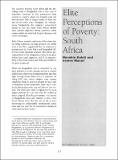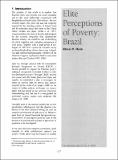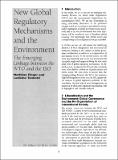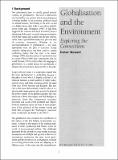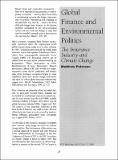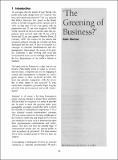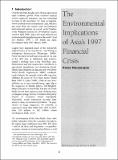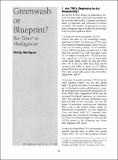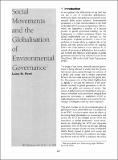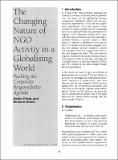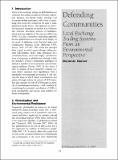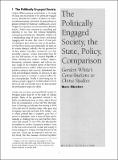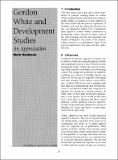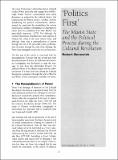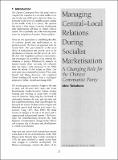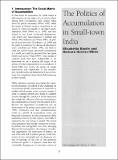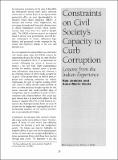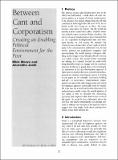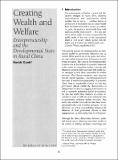Volumes 21 - 30: Getting Institutions Right for Women in Development: Recent submissions
Now showing items 421-440 of 444
-
Elite Perceptions of Poverty: South Africa
(Institute of Development Studies, 01/04/1999)Summaries Elite perceptions of poverty in South Africa are affected by the distinctive character of social segmentation there. The huge size of segments and the immense distances (social, economic and psychological) between ... -
Elite Perceptions of Poverty: Brazil
(Institute of Development Studies, 01/04/1999)Summaries The article discusses how Brazilian elites view poverty and social inequality and offers some preliminary comparisons with the perceptions of elites in Bangladesh and South Africa. Based upon survey research, ... -
New Global Regulatory Mechanisms and the Environment:
(Institute of Development Studies, 01/07/1999)Summary This article seeks to highlight the emerging linkage between the World Trade Organisation (WTO) and the International Organisation for Standardisation (ISO). This relationship is seen against a background of ... -
Globalisation and the Environment:
(Institute of Development Studies, 01/07/1999) -
Global Finance and Environmental Politics:
(Institute of Development Studies, 01/07/1999)Summary This article outlines how insurance companies have so far responded to climate change. Such change threatens the viability of much of their business, by disrupting the actuarial data on which insurance risks are ... -
Towards a World Environment Organisation?
(Institute of Development Studies, 01/07/1999)Summary This article explores the possible need for a new international body to address environmental problems along the lines of a World Environment Organisation (WEO). A case is made that existing institutions and policy ... -
‘The Greening of Business?’
(Institute of Development Studies, 01/07/1999)Summary The general public in many countries throughout the world has become increasingly cynical about the extent to which large companies have engaged in genuine attempts to reduce their impact on the environment. As ... -
The Environmental Implications of Asia's 1997 Financial Crisis
(Institute of Development Studies, 01/07/1999)Summary This article assesses the environmental implications of the Asian financial crisis in South?East Asia and Melanesia, covering the period from mid?1997 until early 1999. It examines the implications for agricultural ... -
Greenwash or Blueprint?
(Institute of Development Studies, 01/07/1999)Summary This article contributes to the debate over the willingness, ability and sincerity of transnational corporations (TNCs) to improve their environmental and social records. It draws on recent research conducted in ... -
Social Movements and the Globalisation of Environmental Governance
(Institute of Development Studies, 01/07/1999)Summary Environmental governance has become globalised as part of a wider agenda of global governance building within key institutions such as the World Trade Organisation (WTO). The perceived need for global solutions ... -
The Changing Nature of NGO Activity in a Globalising World:
(Institute of Development Studies, 01/07/1999)Summary As a result of the ruling neo?liberal paradigm and increasing economic, social and political globalisation, the nature of the relationship between transnational corporations (TNCs) and non?governmental organisations ... -
Defending Communities:
(Institute of Development Studies, 01/07/1999)Summary Much of the academic literature on globalisation and resistance has tended to focus narrowly on the opposition of states against markets, of Keynesian welfare economics against the neo?liberal model behind ... -
The Politically Engaged Society, the State, Policy, Comparison
(Institute of Development Studies, 01/10/1999)Summaries Gordon White's contributions to the study of China fall under at least four major rubrics. Most important was his analysis of political engagement by a breathtaking range of social classes and groups in both the ... -
Gordon White and Development Studies
(Institute of Development Studies, 01/10/1999)Summaries This article has a threefold purpose. First, it highlights some aspects of Gordon White's contribution to development studies. Second, it outlines some of the more enduring concepts and approaches that Gordon ... -
‘Politics First’
(Institute of Development Studies, 01/10/1999)Summaries This article looks at the early period of Gordon White's engagement with China and the party?state. Gordon and Marc Blecher examined the impact of the Cultural Revolution on the politics of a basic level technical ... -
Managing Central?Local Relations During Socialist Marketisation
(Institute of Development Studies, 01/10/1999)Summaries In the early years of reform, the reduction of the party's power took place alongside decentralisation; since 1993, however, party leadership has been reinforced as part of the measures to strengthen central ... -
The Politics of Accumulation in Small?town India
(Institute of Development Studies, 01/10/1999)Summaries Using the analytical framework of social structures of accumulation, the economic politics of local urban civil?social organisations and their impact on capital, class and the business economy is examined. ... -
Constraints on Civil Society's Capacity to Curb Corruption
(Institute of Development Studies, 01/10/1999)Summaries This article suggests reasons why it is particularly difficult for civil society to organise effectively to curb forms of corruption which disproportionately afflict the poor. We take issue with currently ... -
Between Cant and Corporatism
(Institute of Development Studies, 01/10/1999)Summaries Aid and development agencies like to believe that they manage their development programmes in ways that empower the poor. This is rare in practice, even (or especially?) in the case of newly?fashionable programmes ... -
Creating Wealth and Welfare
(Institute of Development Studies, 01/10/1999)Summaries This article examines the role of China's rural township and village governments in welfare provision. In it, I first describe the role of local officials in the promotion of collective and private enterprise, ...

